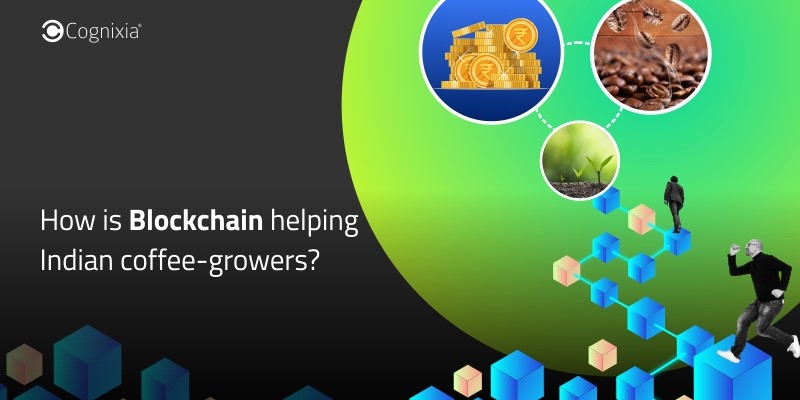It took two seasons, for sure, but coffee farmers are finally warming up to the Coffee Board of India’s blockchain-based portal.
Earlier this year, in March 2019, the Coffee Board of India partnered with the software company Eka Software Solutions in order to launch a blockchain-based platform for coffee farmers across the country. This platform is aimed to integrate the farmers with markets in a transparent manner and lead to the realization of a fair price for the coffee producer. In this context, Blockchain would reduce the number of layers between the coffee-growers and the buyers, thereby helping farmers to about double their incomes.

India is the only country in the world, where all its coffee is grown under shade, handpicked and sub-dried, producing one of the best coffees in the world, mostly by small coffee growers and tribal farmers, close to national parks and wild life sanctuaries in the belt of the Western Ghats and the Eastern Ghats in the southern peninsula of India. Indian coffee is very highly valued in the global market and makes up a large share of premium coffees sold around the world. Despite this, the share of the farmers in the final returns is quite minimal. Intermediary agents take about 5-10% cut for connecting the coffee growers to the buyers, and in the end, farmers end up getting less than 5% of the money for each cup of coffee that is sold to the consumer. With this blockchain platform, the government hopes to rule out unnecessary intermediaries while giving farmers the chance to earn better prices for their produce.
In such a scenario, the blockchain -based marketplace application for the trading of Indian coffee would not only bring much-needed transparency in operations but also help maintain a proper traceability of the Indian coffee from the bean to the cup, while ensuring the each grower is paid fairly for his produce. This platform would reduce the farmers’ dependency on intermediaries by giving them direct access to the buyers in return for a fair price, while also helping them find the right coffee suppliers for exporting their produce and also managing the timelines for the entire process. This, in turn, would build trust and reliability in the entire value chain.
On this platform, all the involved stakeholders would need to register themselves to be able to make their trade transactions – coffee farmers, traders, coffee curers, exporters, roasters, importers and registered retailers. The coffee farmer has to punch in the details of his produce, such as, the place where the coffee is grown, details of his crop, the elevation, attach any certificates associated and any other essential details. Consequently, a block is created for each lot of coffee that the farmer sells on this blockchain platform. The credentials for each block get stored in the blockchain throughout its journey through the platform, and the details are immutable.
Back in March, when the platform was launched, it received a very lukewarm, even cold response from the farmers, with only 23 of them actually registering on the platform, accounting for only about 100 tonnes of the 320,000 tonnes of coffee that India produces on an average annually. However, it is important to note that March is typically the off-season in the coffee growing calendar. The peak season goes from November to February. And now, in November, more than 30,000 coffee growers have already registered on the platform.
Quality of the coffee in the global market is highly dependent on the region it was cultivated in. about 70% of the coffee produced in India gets exported, and the Coffee Board of India is hoping that by bringing in more transparency and traceability to Indian coffee, it will attract more global buyers, in a world where traceability and transparency are becoming increasingly important. The Coffee Board is also trainings its personnel to certify the quality of the coffee it receives from coffee growers to provide verifiable certificates that can be uploaded on the blockchain platform. The board also plans to bring international coffee curers whose certificates will hold immense value for the Indian coffee in the global markets. Not only this, through this portal, farmers can start deploying smart contracts between themselves and their buyers. Coffee growers can draw up legally binding agreements through this blockchain-based portal without the need for a legal contract. the portal uses Ethereum’s Smart Contract functionality and includes counterparty information, quality and quantity. However, with cryptocurrencies being banned in India, no financial transaction will be taking place on this platform. This is the first time in the world that a government agency is using blockchain technology to help the population of its country. The portal is available on the web, as well as a mobile app.

Blockchain is one of the most happening technologies of current times and it holds immense potential to transform so many sectors in unimaginable ways. It brings immense transparency and reliability to operations. Cognixia – World’s leading digital workforce solutions company strives to help organizations around the world gain the necessary blockchain skills to be able to help them along in their digital transformation journeys, while making the most of blockchain. Our carefully crafted training programs are customizable to meet individual client requirements and are constantly updated to ensure that all the latest developments get incorporated into the curriculum. Our courses focus on practical, hands-on learning and providing the best learning experience to its participants. Reach out to us to know more about our course offerings and services.

